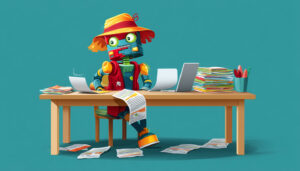Microsoft and Google: Competing for the Leading AI Assistant

Microsoft and Google: Competitive Innovations in AI
As Microsoft celebrates its 50th anniversary this year, it finds itself in a pivotal moment alongside Generation Z, represented by Google, which is now about 26 years old. Both tech giants are in high spirits, with Microsoft showcasing significant retrospectives and Google strengthening its grip on artificial intelligence (AI) and AI-powered devices. Recently, both companies have released exciting updates in the AI space, prompting us to explore their latest developments and the current landscape of artificial intelligence.
Google’s Latest Advancements: Gemini Live
What is Gemini Live?
Among Google’s innovations is an upgraded feature known as Gemini Live, available to subscribers of Gemini Advanced, as well as users of the new Google Pixel 9 and Samsung Galaxy S25. Gemini Live allows users to interact with a smart assistant using natural language, asking questions and receiving real-time responses. With this new update, video has been introduced as a medium for conveying information, complementing the existing text, images, and voice commands it understands.
Features and Capabilities
The capabilities of the Gemini Live feature reflect aspects seen last year in Project Astra, which focused on developing a true AI assistant. Demonstrations at Google’s London headquarters showcased how a Pixel phone could relay visual information to Gemini while answering questions such as, "What cocktail can I make with these mixers?" or "What can I cook with the contents of my fridge?" Although Gemini does not analyze every frame of video, it captures still images for processing.
Despite its impressive abilities, Gemini still faces limitations. It can only remember recent visual data and struggles to swiftly execute certain tasks, such as booking flights across various applications. The team admits there’s room for improvement in terms of speed and reliability.
Microsoft’s Approach: Copilot
Copilot and its Integration
A few days later, we spoke with Lucas Fitzpatrick, Creative Director of Microsoft AI, about the capabilities of Microsoft’s Copilot, which rivals Google’s Gemini. Copilot has been integrated into various Office apps, but experts agree that widespread usage remains a challenge for both technologies. Microsoft’s Copilot is designed to be a digital companion providing contextual assistance and aims to foster a more emotional relationship with users.
Additionally, Microsoft has introduced a tool called Recall, which takes regular screenshots of users’ computers to create an extensive visual database of their activity. However, this feature raises privacy concerns.
Designing for Interaction
Fitzpatrick emphasizes how AI is transforming interactions and design. The goal is to shift from rigid commands to normal conversational exchanges, paving a new path for user experience. The Copilot branding is characterized by intertwined rainbow-like ribbons, symbolizing possibilities and the nature of providing assistance.
Comparisons of AI Functions
Gemini Live vs. Copilot
Both Google and Microsoft’s AI offerings aim for similar user engagement, with features that include innovative solutions for problems like cooking suggestions and video analysis. For instance, Google’s Gemini includes functionalities for live interactions based on visual cues, while Microsoft’s Copilot emphasizes emotional connection and contextuality in digital assistance.
The Role of Memory in AI
One interesting feature of Gemini is its visual memory aspect, which currently allows it to retain information for only the last seven minutes. However, conversation text lives in the cloud indefinitely, signifying a step towards creating an intelligent assistant that can remember context between user interactions.
Challenges and Concerns
While the advancements in AI are noteworthy, significant challenges remain, particularly concerning privacy and data handling. Companies like Google have to reassure users on data protection, especially when the technology operates within personal spaces.
Moreover, a tension exists between embracing creative content generation and preserving standard journalistic principles. Google recently admitted that its algorithm updates aim to improve the visibility of content from creators. However, it remains unclear how it defines "great content," potentially overlooking traditional journalism in favor of more engaging or creative media.
Future Prospects
Both Google and Microsoft are at the forefront of AI development, each on a path that aims to address user demands while navigating ethical considerations. While the technology offers exciting possibilities, users should remain cautious about privacy and the impact of widespread AI adoption on traditional content creation. These developments underline the need for careful thought about how technology can enhance human experiences without compromising ethical standards.






